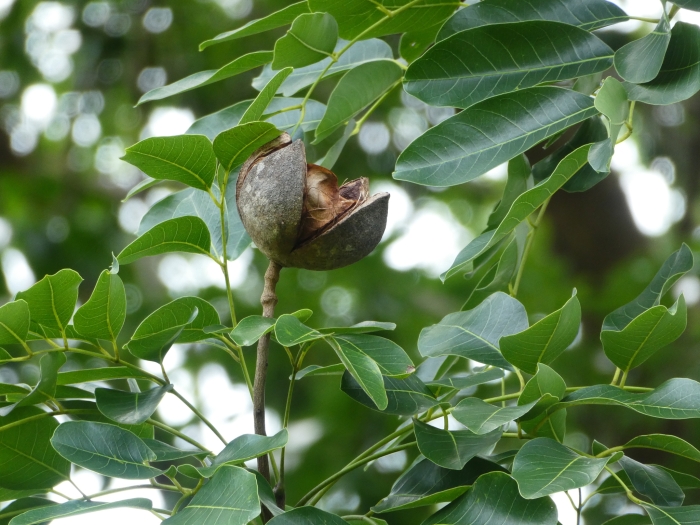African Mahogany
(Khaya senegalensis)
African Mahogany (Khaya senegalensis)
/
/

© Steve Fitzgerald
CC BY-SA 4.0
Image By:
© Steve Fitzgerald
Recorded By:
Copyright:
CC BY-SA 4.0
Copyright Notice:
Photo by: © Steve Fitzgerald | License Type: CC BY-SA 4.0 | License URL: http://creativecommons.org/licenses/by-sa/4.0/ | Uploader: junglenut | Publisher: iNaturalist |

























Estimated Native Range
Summary
Khaya senegalensis, commonly known as African Mahogany, is a fast-growing, deciduous tree native to the savannas and riparian forests of West and Central Africa, stretching from Senegal to Uganda. It can reach up to 98 feet (30 meters) in height and is characterized by its dark gray, fissured bark and a straight, cylindrical trunk with a dense, rounded crown. The pink-red heartwood is highly valued. African Mahogany blooms with clusters of sweet-scented, small white flowers during the rainy season, which are followed by woody, four-lobed capsules containing black seeds.
This species is appreciated for its ornamental qualities, including its impressive stature and the shade it provides. It is also planted for its durable, termite-resistant wood, which is used in high-quality furniture, cabinetry, and boat building. In its native environment, the tree’s deep root system makes it remarkably drought-tolerant, suitable for reforestation projects and as a shade tree in agroforestry systems. African Mahogany prefers full sun and well-drained soils. While it is generally low-maintenance, it can be susceptible to pests such as the Mahogany shoot borer. The bark has been traditionally used in Africa for its medicinal properties to treat fevers and wounds. However, the species is vulnerable due to overexploitation for its valuable timber and habitat loss.CC BY-SA 4.0
This species is appreciated for its ornamental qualities, including its impressive stature and the shade it provides. It is also planted for its durable, termite-resistant wood, which is used in high-quality furniture, cabinetry, and boat building. In its native environment, the tree’s deep root system makes it remarkably drought-tolerant, suitable for reforestation projects and as a shade tree in agroforestry systems. African Mahogany prefers full sun and well-drained soils. While it is generally low-maintenance, it can be susceptible to pests such as the Mahogany shoot borer. The bark has been traditionally used in Africa for its medicinal properties to treat fevers and wounds. However, the species is vulnerable due to overexploitation for its valuable timber and habitat loss.CC BY-SA 4.0
Plant Description
- Plant Type: Tree
- Height: 60-80 feet
- Width: 40-50 feet
- Growth Rate: Moderate
- Flower Color: White, Yellow
- Flowering Season: Summer
- Leaf Retention: Evergreen
Growth Requirements
- Sun: Full Sun
- Water: Medium
- Drainage: Medium, Fast
Common Uses
Erosion Control, Low Maintenance
Natural Habitat
Native to the savannas and riparian forests of West and Central Africa
Other Names
Common Names: African Mahogany, Dry Zone Mahogany, Bisselon, Benin Mahogany
Scientific Names: , Khaya senegalensis, Khaya senegalensis var. quadrivalvis, Khaya senegalensis var. spectabilis, Swietenia senegalensis, Swietenia senegalensis,
GBIF Accepted Name: